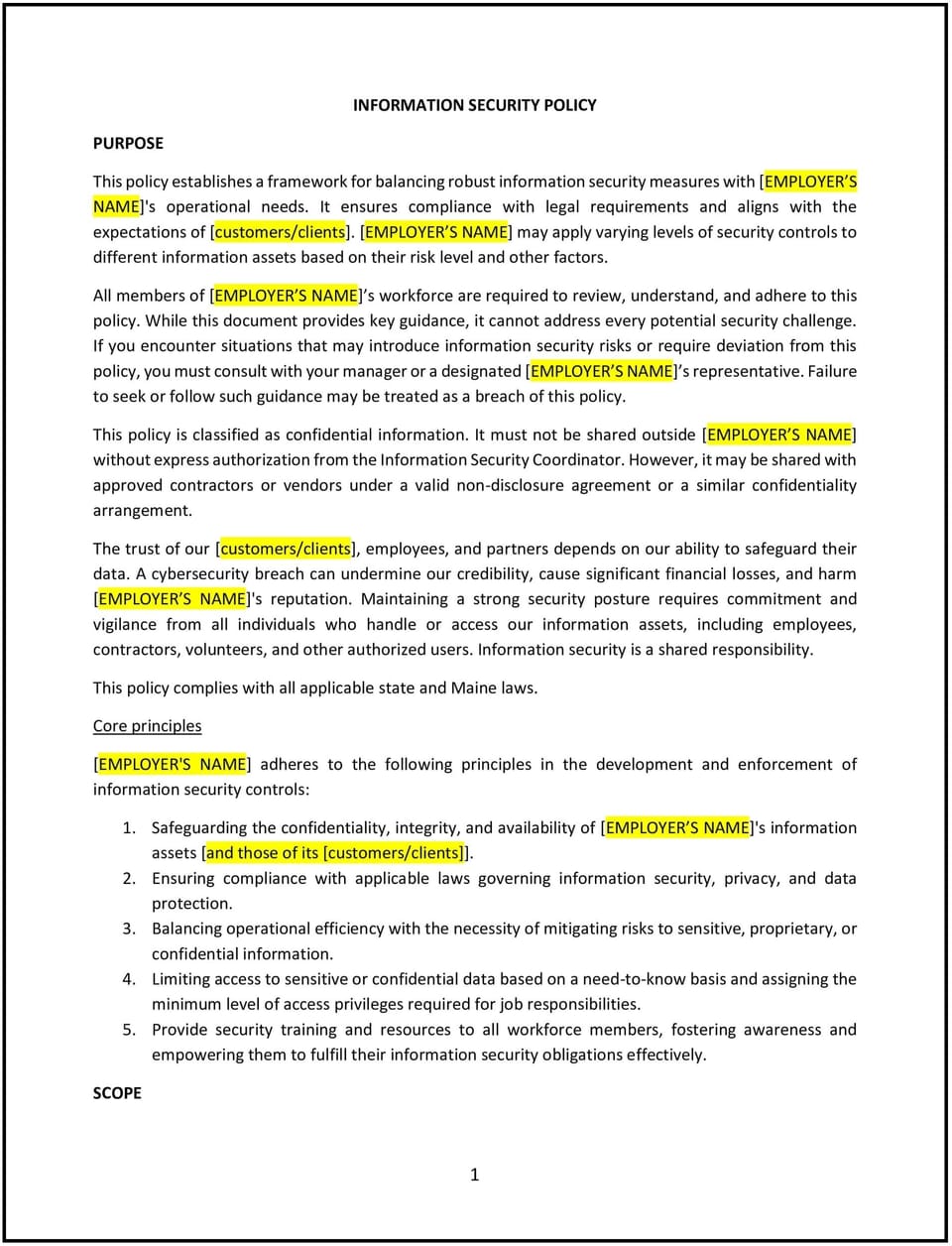Information security policy (Maine): Free template

Information security policy (Maine): Free template
This information security policy is designed to help Maine businesses protect sensitive data, prevent unauthorized access, and support compliance with state and federal regulations. It outlines standards for managing digital and physical information, responding to security incidents, and maintaining a secure work environment.
By implementing this policy, Maine businesses can safeguard critical assets, build trust with stakeholders, and reduce risks associated with data breaches.
How to use this information security policy (Maine)
- Define scope and purpose: Clearly state that the policy applies to all employees, contractors, and third-party vendors who handle company information.
- Identify sensitive information: Specify what constitutes sensitive data, such as customer information, financial records, trade secrets, and personal employee data.
- Establish access controls: Detail procedures for granting, modifying, and revoking access to information systems and data.
- Outline security measures: Include requirements such as password protection, encryption, two-factor authentication, and regular software updates.
- Address incident response: Provide steps for identifying, reporting, and resolving security incidents or data breaches.
- Include employee responsibilities: Emphasize the role of employees in safeguarding information, such as avoiding phishing scams and reporting suspicious activities.
- Review regularly: Update the policy to reflect changes in Maine regulations, technological advancements, or business needs.
Benefits of using this information security policy (Maine)
Implementing this policy provides several benefits for Maine businesses:
- Protects sensitive data: Reduces the risk of unauthorized access, data breaches, and information theft.
- Ensures compliance: Aligns with state and federal regulations, such as data protection and privacy laws.
- Enhances trust: Builds confidence among customers, partners, and employees in the business’s commitment to security.
- Mitigates risks: Establishes proactive measures to prevent and respond to security incidents.
- Promotes accountability: Clarifies employee roles and responsibilities in maintaining information security.
Tips for using this information security policy (Maine)
- Train employees: Provide regular training on information security best practices and awareness of common threats like phishing.
- Monitor systems: Implement tools to track and analyze access logs, user activity, and potential vulnerabilities.
- Conduct audits: Regularly review security protocols, systems, and compliance with the policy.
- Secure devices: Require employees to use company-approved devices with up-to-date security software for work-related tasks.
- Encrypt data: Ensure all sensitive data is encrypted both in transit and at rest.
- Document incidents: Maintain detailed records of security breaches and response efforts to improve future practices.
Q: What types of information are covered under this policy?
A: This policy covers sensitive data, including customer information, financial records, trade secrets, and personal employee data.
Q: How can businesses ensure employees follow the policy?
A: Businesses can provide training, conduct regular audits, and use monitoring tools to ensure adherence to security practices.
Q: How often should businesses review their information security policy?
A: Businesses should review the policy annually or whenever there are updates to Maine laws or technological advancements.
Q: What steps should businesses take to handle security incidents?
A: Businesses should follow the incident response plan, which includes identifying the issue, containing the breach, notifying relevant parties, and resolving vulnerabilities.
Q: How can businesses secure access to sensitive information?
A: Businesses can use access controls, enforce strong passwords, implement two-factor authentication, and regularly update permissions.
Q: What role do employees play in information security?
A: Employees are responsible for safeguarding information by following the policy, avoiding phishing scams, and reporting suspicious activities.
Q: What tools can businesses use to enhance information security?
A: Businesses can use firewalls, intrusion detection systems, encryption software, and endpoint security solutions to protect information.
This article contains general legal information and does not contain legal advice. Cobrief is not a law firm or a substitute for an attorney or law firm. The law is complex and changes often. For legal advice, please ask a lawyer.


